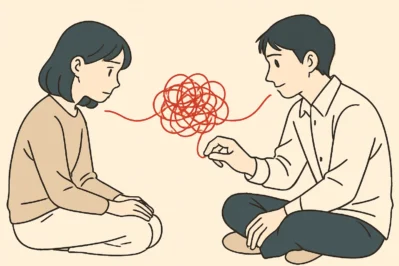K-Drama Level Up: How to Have a Serious Talk in Korean
Hello! This is Maeil Hangul, here to upgrade your Korean skills!
Today, we’re diving into a topic that’s a little more serious but incredibly important for any deep relationship: how to have a serious talk about problems with your partner in Korean. These phrases will help you express your feelings clearly and navigate those difficult conversations, moving beyond simple “I love yous.”
Lately in Korea, reality dating shows like Transit Love (환승연애) are a huge trend, and viewers are fascinated by how the couples have raw, honest conversations about their issues. It’s a hot topic! So, let’s learn how to have those mature, K-drama-worthy discussions ourselves.
Core Expressions for Your Heart-to-Heart
Here are four essential phrases to help you express yourself clearly and thoughtfully during a serious conversation.
1. 우리 얘기 좀 해 (Uri yaegi jom hae)
- Pronunciation [Romanized]: Oo-ree yae-gi jom-hae
- English Meaning: We need to talk.
- Detailed Explanation: This is the classic phrase to signal that you want to have a serious conversation. The word 좀 (jom), a shortened form of 조금 (jogeum), literally means “a little” and is often used to make requests sound softer or more polite. However, in this context, the atmosphere is still quite serious. It tells the other person, “Okay, this is important.” Use it when you need to make sure you have their full attention.
2. 오해가 있었던 것 같아 (Ohae-ga isseotdeon geot gata)
- Pronunciation [Romanized]: Oh-hae-ga iss-eot-deon geot ga-ta
- English Meaning: I think there was a misunderstanding.
- Detailed Explanation: This is a brilliant way to de-escalate a conflict. Instead of placing blame (e.g., “You misunderstood me”), this phrase presents the issue as a mutual 오해 (ohae – misunderstanding). The grammar pattern -던 것 같다 (-deon geot gata) means “it seems like…” or “I think that…”, which makes your statement sound less accusatory and opens the door for a calm discussion.
3. 네 입장을 이해하지만… (Ne ipjang-eul ihae-hajiman…)
- Pronunciation [Romanized]: Nee ip-jang-eul ee-hae-ha-jee-man…
- English Meaning: I understand your position, but…
- Detailed Explanation: Empathy is key in any difficult conversation. This phrase shows that you are listening and acknowledging your partner’s perspective first. 입장 (ipjang) means ‘stance’ or ‘position’. The grammar point -지만 (-jiman) means “but,” allowing you to validate their feelings before gently introducing your own point of view. It transforms a potential argument into a collaborative problem-solving session.
4. 솔직히 말하면… (Soljikhi malhamyeon…)
- Pronunciation [Romanized]: Sol-jeek-hee mal-ha-myeon…
- English Meaning: To be honest… / Honestly speaking…
- Detailed Explanation: Use this phrase when you need to be very direct and share your genuine feelings. 솔직히 (soljikhi) means “honestly” or “frankly.” Starting your sentence with this signals that you’re about to be vulnerable and sincere, which encourages your partner to listen carefully to what you’re about to say.
Example Dialogue
Let’s see how these expressions work in a real conversation. Imagine Minjun (A) and Sora (B) have been feeling a bit distant lately.
A (민준): 소라야, 우리 얘기 좀 해.
(Sora, we need to talk.)B (소라): 응? 알겠어. 무슨 일이야?
(Huh? Okay. What’s going on?)A (민준): 요즘 우리 사이에 오해가 있었던 것 같아. 솔직히 말하면, 내가 좀 서운했어.
(I think there’s been a misunderstanding between us lately. To be honest, I’ve been feeling a bit hurt.)B (소라): 서운했다고? 왜? 내가 뭐 잘못했어?
(Hurt? Why? Did I do something wrong?)A (민준): 네가 요즘 너무 바쁜 거 알아. 네 입장을 이해하지만, 연락이 너무 없어서 우리가 멀어지는 기분이었어.
(I know you’re very busy these days. I understand your position, but there was so little contact that I felt like we were growing distant.)B (소라): 아… 그렇게 느꼈구나. 정말 미안해. 내가 너무 내 일만 생각했네.
(Ah… you felt that way. I’m so sorry. I was being too selfish and only thinking about my work.)
Culture Tip: The Power of Nunchi (눈치) in Conversations
In Korea, the phrase “우리 얘기 좀 해” can feel very heavy and is often associated with breakups in K-dramas! Because of this, people might try to avoid it unless it’s extremely serious.
This is where the concept of 눈치 (nunchi)—the subtle art of reading a situation and understanding others’ feelings—comes in. As seen on shows like Transit Love, people often test the waters with softer phrases first, like “잠깐 시간 돼?” (Do you have a moment?).
Using today’s phrases shows you can handle a serious topic, but using them with good nunchi—at the right time and in the right tone—will make you seem like a native speaker! It shows you’re not just speaking Korean, but you’re also understanding the culture behind the words.
Wrap-up & Practice Time!
Amazing work today! You’ve learned some powerful phrases for navigating one of the most challenging parts of any relationship. You now know how to start a serious talk, clear up misunderstandings, show empathy, and be honest with your feelings.
Now, let’s put it into practice!
- Fill-in-the-blank: You want to honestly express your feelings, but you also want to acknowledge your partner’s busy schedule.
네 입장을 이해하지만, ________ ________, 나는 좀 외로웠어.
(I understand your position, but, to be honest, I was a bit lonely.) - Make a Sentence: Imagine your partner forgot your anniversary. How would you gently bring it up, starting with the idea that it might be a misunderstanding?
Leave your answers and your own practice sentences in the comments below! We can’t wait to see what you come up with.






